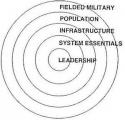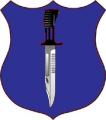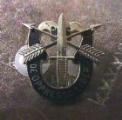Connections are always interesting; though they may mislead and take one down the primrose path to perdition.
The Industrial War College is formally the Industrial College of the Armed Forces, and used to be the Army Industrial College - from the Wiki:
Now, Bernard Baruch was an interesting figure of my youth (he lived until he was 95 in 1965, when I was 23The Industrial College of the Armed Forces (ICAF) is a U.S. military educational institution tasked with preparing military officers and civilian government officials for leadership and executive positions in the field of national security. Established in 1924 in the aftermath of America’s mobilization difficulties in World War I, its predecessor, the Army Industrial College, focused on wartime procurement and mobilization procedures. Bernard M. Baruch, who was a prominent Wall Street speculator and Chairman of the War Industries Board, is regarded as one of the founding fathers.
.....
ICAF moved into a newly constructed facility, Eisenhower Hall, in 1960. During the next several years, a period that Baruch termed the Cold War, the character of ICAF changed dramatically. As the United States found itself increasingly involved in Vietnam, ICAF shifted to educating leaders to manage logistical resources in such conflicts, as opposed to focusing on national industrial mobilization.), advisor of presidents from Wilson through Kennedy. Baruch was certainly linked to the Industrial College, and the Industrial College was linked to our 1962 "Counterinsurgency" anthology; but so what - Bernard Baruch did not author the book.
Slap, you've selected one Franklin Lindsay as the author with still-current impact on the subject. So, what do we know about him - actually quite a bit; but you have to go to the Hoover Institution Archives, Stanford University, Register of the Franklin Lindsay Papers, 1943-1994 (10 pages).
From that list of papers, we find Lindsay's brief bio (p.3 pdf):
In 1946, Lindsay was 30; and running in some pretty high-flying company as Bernard Baruch's Exec Asst. Lindsay's expertise was in the area of economic aid and FID.1916, March 12 Born in Kenton, Ohio
1938 A.B., Stanford University
1938-1939 With Columbia Division, U.S. Steel Corp.
1940-1945 Served in the Army of the United States, to Lieutenant Colonel
1944-1945 With the Office of Strategic Services
1945 Chief, American Military Mission to Yugoslavia
1946 Executive assistant to Bernard Baruch, U.S. Delegation, U.N. Atomic Energy Commission
1947-1948 Consultant, House Select Committee on Foreign Aid (Herter Committee)
1948-1949 Served as an American representative to the Organization for European Economic Co-operation, Paris
1949-1953 With the Central Intelligence Agency
1953-1956 With the Public Affairs Program, Ford Foundation
1954 Consultant, Second Hoover Commission
1956-1961 With McKinsey & Co., Inc.
1961-1962 Executive Vice President, Itek Corp.
1962-1975 President, Itek Corp.
1975- Chairman of the Board, Itek Corp.
Another interesting connection is the first author in the anthology, Walt Rostow, DNSA to Kennedy and NSA to Johnson - but, over and above those mere positions, Rostow was the creator of this brand of economic theory:
(from the Wiki) That model justified the Kennedy-Johnson approach toward insurgencies and their "cures".Rostow was famous especially for writing the book The Stages of Economic Growth: A non-communist manifesto (1960) which became a classic text in several fields of social sciences.
...
Rostow developed the Rostovian take-off model of economic growth, one of the major historical models of economic growth. The model argues that economic modernization occurs in five basic stages of varying length—traditional society, preconditions for take-off, take-off, drive to maturity, and high mass consumption. This became one of the important concepts in the theory of modernization in the social evolutionism.
Rostow was also OSS during WWII.
So, there are some interesting, connected figures in this story.
Cheers
Mike




 Reply With Quote
Reply With Quote










Bookmarks